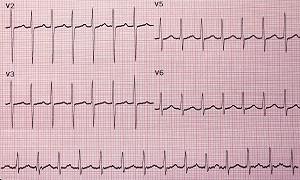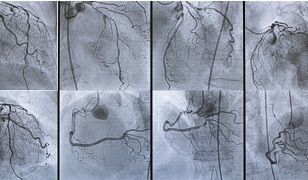Heart Failure
Heart Failure is a condition in which heart muscles cannot pump enough blood to meet the body’s requirements. It usually occurs because the heart has become too weak or stiff. It’s sometimes called congestive heart failure.
Causes of Heart Failure
- Coronary artery disease- In this condition plaque accumulates in the arteries which causes reduced blood flow and can lead to heart attack.
- Hypertension (High blood pressure)- This can make the heart muscle too stiff or too weak to effectively pump blood.
- Damaged or diseased heart valves- A damaged valve forces the heart to work harder, which can lead to weakening of heart.
- Cardiomyopathy- (damage to the heart muscle).
- Myocarditis (inflammation of heart muscle)- It can lead to left-sided heart failure.
- Congenital heart defects
- Diabetes
- HIV
- Alcohol & drug use
- Obesity
Signs & symptoms of Heart Failure
- Shortness of breath (dyspnea)
- Fatigue and weakness
- Swelling in the legs, ankles, feet & abdomen
- Irregular heartbeat
- Persistent cough or wheezing
- Increased need to urinate at night
- Fluid retention
- Lack of appetite and nausea
- Difficulty in concentrating
- Sudden severe shortness of breath
- Chest pain
Diagnosis of Heart Failure
Blood tests
Chest X- ray
Electrocardiogram (ECG)
CT scan
CT scan is used to collect images of your heart and chest.
MRI
MRI is done to figure out problems with your heart muscle or the tissues that surround the heart.
Coronary angiogram
Myocardial biopsy
Types of Heart Failure
Left-sided heart failure
Left-sided heart failure involves the accumulation of fluids in the lungs leading to shortness of breath.
Right-sided heart failure
Right-sided heart failure involves the accumulation of fluids in the abdomen, legs & feet leading to swelling.
Systolic heart failure
In systolic heart failure, the left ventricle cannot contract leading to a pumping problem.
Diastolic heart failure
In diastolic heart failure, the left ventricle can’t relax or fill fully, leading to a filling problem.
FAQs
1. Can heart failure be fatal?
Heart failure can be fatal if goes untreated. Heart failure is a serious medical condition that requires treatment.
2. Can the symptoms of heart failure be reduced?
Managing heart failure the right way can help to reduce the symptoms and slow down the progression of the condition.
3. Can losing weight help to reduce the risks of heart failure?
Only 5-10% of body weight can help reduce the risk of developing heart disease






